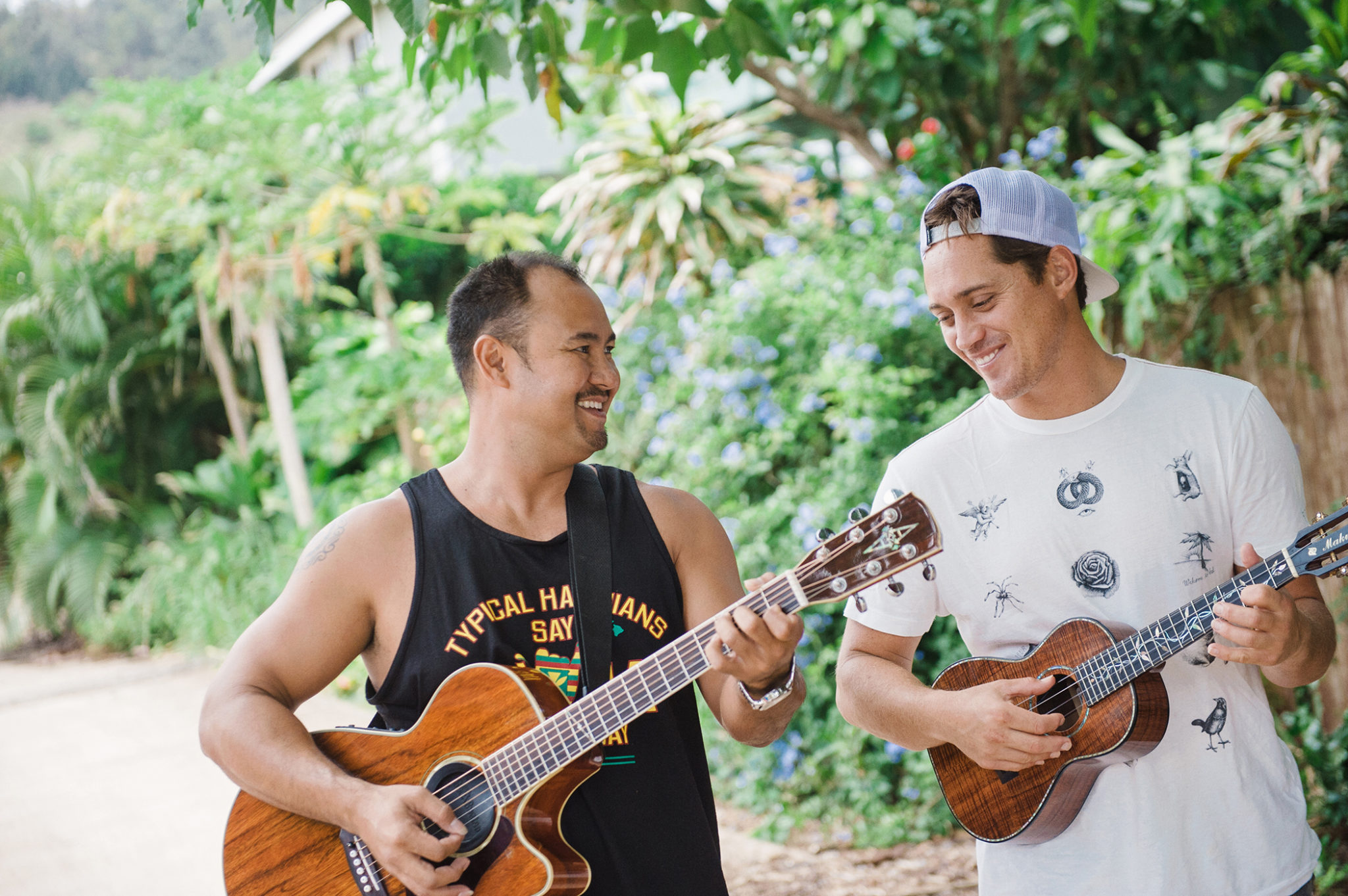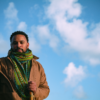As ambassador of Hawai‘i’s modern surf culture, big wave surfing champ Makua Rothman says it’s time to unionize.
Just past a bakery known for its gloriously unhealthy pies, where the color of tourists’ limbs range from Elmer’s Glue white to Red Lobster crimson, the Rothman ‘ohana compound is abuzz. A contractor and friend of Makuakai Rothman (Makua, for short) hammers away at the siding of a garage dedicated to a growing surfboard lānai collection.
On the upstairs lånai, Eddie Rothman, Makua’s father, talks story while using a rusty machete to hack at a pile of coconuts. Everyone but Makua seems allergic to shirts. Pit bulls patrol the perimeter.
A few trucks parked out front have been lifted to monster levels. It’s like an aggressive alternate universe. But when we sit to speak, the place is a contrast to Makua’s personality: He is too handsome, articulate, short, and calm to be imposing.
Tales of O‘ahu’s North Shore from the 1970s and 1980s have become popular fodder for surf journalists. It was the era when surfing became an international, corporate-sponsored sport, and also when the “Seven Mile Miracle” became known as much for pugilistic violence as it was for aggressive surfing.
“Fast” Eddie Rothman is mentioned in many of these stories. Having arrived to Hawai‘i as a rough Jewish teen from Philadelphia, he was involved in the unseemly aspects of the sport: the violent reprisals, the ill-gotten funds, the connections to organized crime.
Much of this history has been acknowledged by Eddie; most has passed into legend. Eddie was in and out of prison until 1990 when he aimed for legitimacy and continued his leadership of the group he founded, the Hui O He‘e Nalu, or Da Hui, and organized other surfers into a loose coalition that acted as enforcers, water safety officers, and community spokesmen.
The unofficial stories of violence and the syndicate served as a sort of validating authority. It’s a legacy that has maintained Native Hawaiian presence in the water, and kept disrespecting folks out. But defining oneself within this spectrum of masculinity can be toxic; the North Shore has its fair share of salty uncles who let the aggressive culture consume them, who never found peace.
For Eddie, he became the picture of fatherhood, driving his three boys around the island for surf contests, forcing helmets on them during big swells, taking them to visit musician Israel Kamakawiwo‘ole after sessions at Makaha.


North Shore kids learn to surf early, and while Makua was no exception, he didn’t always have it easy.
“I was always chubbier than the other kids,” he says. “I was 130 pounds when my friends were 80.” He also had asthma. But he kept working at it, telling himself to breathe on days with big sets. “I had to surf the outside to have any fun,” the 30-year-old says of the outer reef, where larger waves hit but with less frequency and more power. “I got good at it, and it became who I am.”
When he was 18, Makua, the oldest of three boys, caught what was then the world’s biggest wave ever paddled into—a colossal 66-footer at Jaws on Maui’s north shore, which earned him the Billabong XXL Global Big Wave Award in 2003.
Since his 20s, he has made lucrative profits from licensing agreements that made him the face of clothing, hotels, energy drinks, music festivals, even sunscreen.
If surfing has taken Makua around the world, his music is taking him even further. As we speak, he’s conversing with his younger brother about trips to perform in Brazil and Japan, playing for tens of thousands of people at the Greenroom Festival in Yokohama. It’s a far cry from when surfing legend Rell Sunn and Eddie would force Makua to play a song before receiving his trophy at keiki surf contest award ceremonies.
“You know, ‘Brown Eyed Girl,’ ‘Noho Pai Pai,’ the classics,” he remembers. Last year, he released a solo album of modern local Hawaiian music produced by the Mountain Apple Company, on which he plays the ‘ukulele and sings. The album has been well received internationally and across the islands, but Makua, as he does with surfing, wants to push the experience further. “My next album is going to be more of my own voice,” he says. “I’ve got to do the music the same way I’ve done everything else. If I blindly accepted advice moving forward, I’d never get anything right.”


Despite Makua’s relative musical success, it’s the decisions in the water that have made him famous. A video of him charging Punta Galea in Spain shows why he is a world champ: Giant waves break far from shore on a grey and windy day like something out of stock footage of WWII naval maneuvers.
Makua catches a wave with a stiff headwind that stalls him at the lip—the worst place to be—before improbably dropping from the sky into a powerful bottom turn and frontside carve. He hesitated long enough to be dramatic.
Another second and he would have been hurled off the top into a cold, punishing abyss. Other online videos show Makua training like a cross between an MMA fighter and an NBA point guard.
Makua Rothman prepares for a sport that, while normalized on billboards and in commercials, can take the lives of seasoned athletes. I feel foolish for not knowing of the existence of the Big Wave Tour, but I am not alone in my ignorance.
The tour has been around since 2009, but it was only when the World Surfing League (formerly the Association of Surfing Professionals, which has managed the men’s and women’s international professional tour since 1976) sanctioned it in 2014 that it gained momentum, attracting the world’s most marketed surfers alongside lesser-known big-wave specialists. Part of the problem, Makua says, is that big-wave surfing is not formatted for television.
“There’s some sort of action, then they cut to it and say, ‘Hey, he did a wing wang! As if anybody knows whatthe announcer is talking about.”
Despite being the 2014/2015 reigning Big Wave Tour champion, Makua had to invoke formal and informal requests to stay on as a wild card for the 2015/2016 tour. The rules, evidently, are still being worked out.


Makua thinks it’s time to get organized, and is working with other big wave surfers to create a sanctioned union that would advocate on their behalf.
“We just want what’s fair, a stage to show our talents, a platform to perform. If this is my life on the line, I should be compensated for it, that’s all,” he explains. “Until we see fit, [the union] needs to be an international one with only the guys who have skin in the game to start. In return, the union respects the sanctioning body that makes all this possible.”
Labor unions, like surfing, rely heavily on hierarchies, with power structures determining who has priority in and out of the arena, working dynamics, even pay scales.
Right now, surfers are responsible for covering their own costs to compete, which can often run them about $6,000 between flights and accommodations. Makua believes it’s an expense the tour should absorb and something the union could help with.
“We need medical, travel, a standard rate of pay, a portion of the broadcasting fees, all of it.” When asked if having Eddie Rothman as his father has led him to these conclusions, he deflects. “Every organization, the government, workers’ unions, the mafia even—they have a structure. We need one, too, otherwise we’ll continue to be taken advantage of. … None of this has come easy. Before my dad got out of jail, we were pretty much homeless. I was sleeping right here on the beach.”
In uniting his fellow athletes and acting as an ambassador of the North Shore’s dualities of masculine aggression and easy charm, Makua is writing new chapters in a family history, ones far more diverse than those that surf journalists have glorified for years.
The Rothmans haven’t come to own more than a hundred acres and stakes in several surf-related businesses on a small island by being stupid, violent, and foolish with their resources.
“You can only put yourself in the best two waves of the heat,” says Makua of big wave competitions. “So it’s less about the guy next to you than it is about what’s going on with yourself, about making good decisions. That, and finding the rhythm of the ocean.”
This story was featured in our Charm Issue.


